Trigger Warning: Narcissistic abuse, abuse from those with BPD traits. “Borderline” and “Narcissist” are used as a label for simplicity purposes (battlers are not defined by their diagnosis). Read at your own discretion.
Why Borderlines & Narcissists Attract Each Other
A big topic in the BPD community is the borderline and narcissist relationship. Ask any mental health professional and they’ll tell you that these two types of personality disorders tend to attract each other. The borderline and narcissist relationship is prevalent & typically abusive. Most likely, a BPD and narcissist couple are incredibly toxic together.
In other words, it’s worth talking about.
People choose romantic partners who are their equals in regards to intimacy. The reason the borderline and narcissist’s relationship is so widespread is because people with BPD and narcissistic personality disorder (NPD) share some of the same intimacy issues. In a nutshell, both groups tend to lack ‘whole object relations’ which is the capacity to simultaneously see both the good and the bad.
Both people with BPD and people with NPD lack “object constancy” which is a fancy way of saying they don’t naturally have the ability to maintain positive feelings over someone while they’re feeling hurt, disappointed or angry with them. People with BPD and NPD also struggle with maintaining emotional connections to someone who is no longer around.
(Read ’35 Signs You’re in a Borderline and Narcissist Relationship’)
Recently, this post I put together for BPD Beautiful made its round of shares on social media. In the comments, one person shared a screenshot of a text thread between them and their partner – it’s since been deleted for their privacy. They’d sent the graphic to their partner in hopes to shed some light on the many bpd traits and bpd symptoms. Who doesn’t want to feel understood by the person they love?
Looking to better understand the BPD & NPD couple? Sadie’s Favorite: A Novel + Original Soundtrack explores FP relationships, trauma bonds and healing after abuse. Click to learn more.
But instead, the person was met with invalidation, ridicule and abrasiveness.
“Yes, I agree you have BPD. I’m aware,” the partner said in response [paraphrased]. “Don’t send this shit to me. I get enough of it on Snapchat, now you’re spamming our texts too?”
Of course, the responses to this screenshot showed alarm for this person’s wellbeing. “That’s abusive.” “You should leave.” “This isn’t someone who will help you get better.” “Even if you did talk about your BPD a lot, there’s no reason for them to be so harsh and minimizing. It makes sense you’d want to talk about it. You live with it everyday!”
The person was astonished with everyone’s comments. Despite being crushed by their partner’s reaction, they didn’t think the red flags were a big enough deal to consider leaving them over. They mentioned their partner had “some narcissistic traits” but that they were an overall chill person. I was happy to read by the end of the thread, they’d said the comments had given them a lot to think about. Hopefully they’ve broken up with their partner by now.
If you can’t already tell, I’m of the opinion that a BPD and narcissist couple should not be. Of course there are exceptions to everything in life—but a big component of NPD is a lack of ability to empathize. A person with BPD, on the other hand, requires a lot of validation and patience in a partner, both of which require empathy.
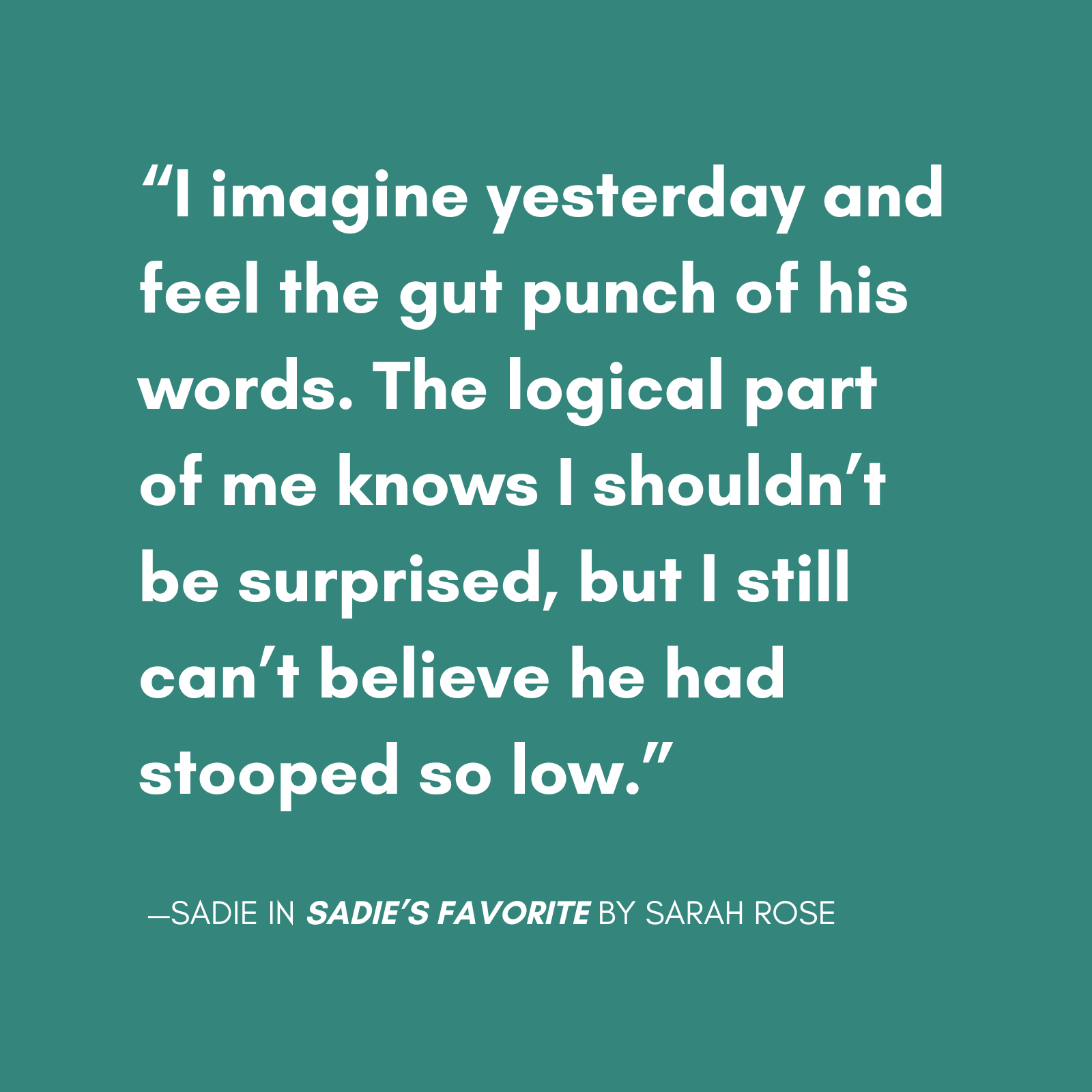
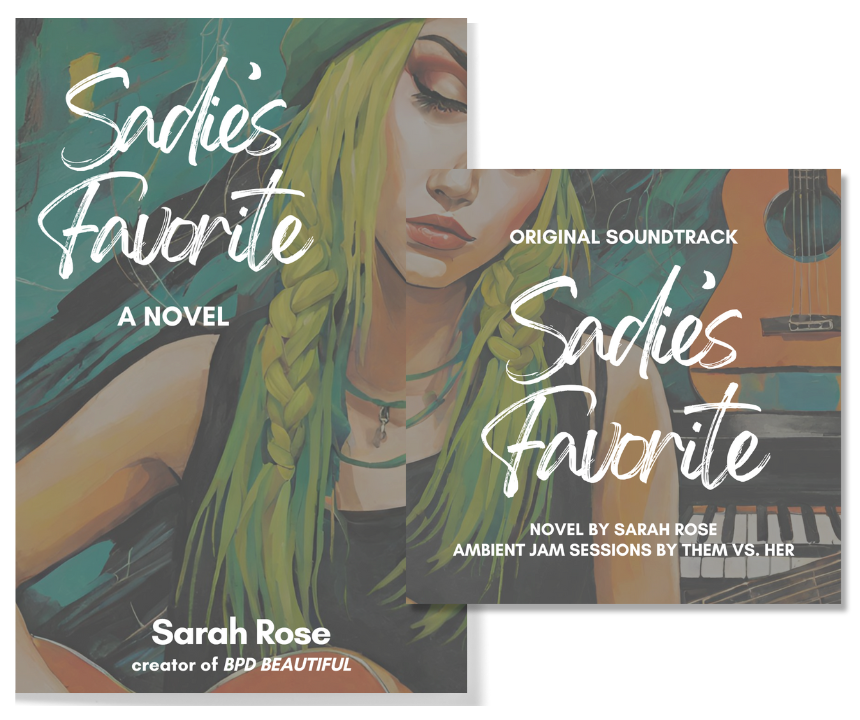
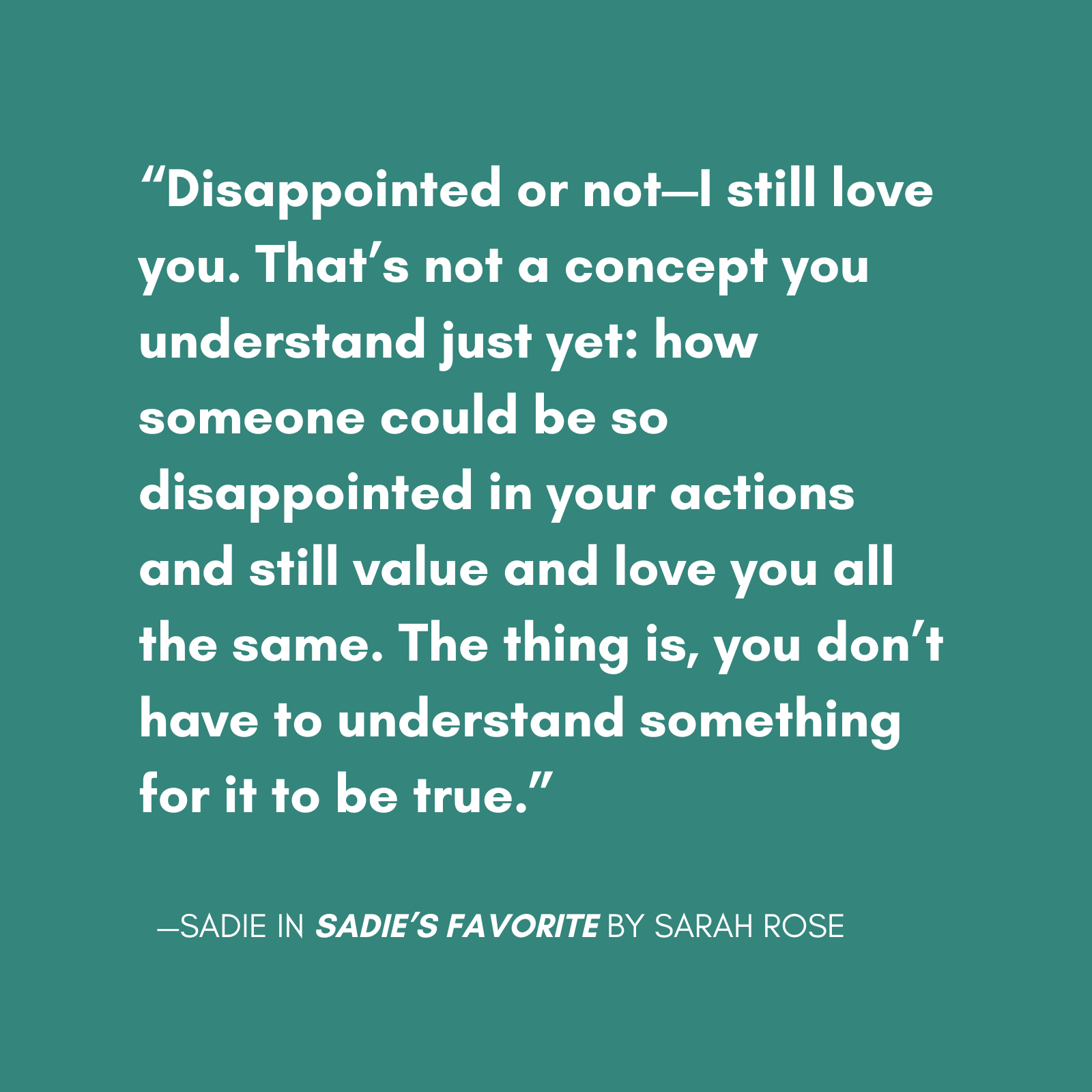
Sadie’s Favorite: A Novel + Original Soundtrack is a character-driven story about BPD recovery, trauma bonds and breaking away from abuse.
An Inside Look to a BPD and Narcissist Couple
I was one half of a BPD and narcissist couple for many years – of course, I only knew my ex was narcissistic in hindsight. I’m about a year and a half out of the relationship at the time of writing this, and I’m still healing from the abuse. I try to avoid using superlatives like “always” or “never” because they suggest splitting, but in this case – it’s appropriate. The relationship with my narcissistic ex was the most intense relationship I’ve ever been in. Never have I loved someone so strongly and genuinely, and never have I been treated so poorly and disdainfully. Our similarities and shared thinking patterns brought us together and connected us in an unimaginable way. But then, the borderline and narcissist relationship dynamics nearly destroyed me.
At the start, things felt like a Hollywood romance and we seemed like a match made in heaven. I was in my early 20’s and pretty naïve. He was 26, a stereotypical “bad boy” and more experienced. We were both moody. Both prone to anger. We had abandonment issues and seemed dependent on the other for validation. Both of us had a history of suicidal ideation. He pulled out the suicide card whenever I wanted to break up. My suicidal ideation sprung up whenever he’d stonewall or invalidate me. He hid his feelings a lot better than I did. I was explosive with my anger. His rage was quiet and passive aggressive. Initially, he loved my clinginess. He said it made him feel needed. It boosted his ego.
It took 6 months until shit hit the fan and the initial discard started. We both idealized and devalued the other a lot over the years – as often seen in people with BPD and NPD. He used my fear of abandonment against me. It was an easy tool to keep me in control. If I said or did something that upset him, all he had to do was threaten to leave. His lack of emotional empathy eventually came to light. I was sometimes shocked someone could be so callous and unconcerned for the wellbeing of others – especially someone he claimed to love. I spent most of the borderline and narcissistic relationship confused, chasing after him, begging for his love and wracking my brain for ways to improve things – for ways to improve myself so I could be a better, more stable partner.
As is stereotypical for a BPD and narcissist couple, we broke up and got back together constantly. He would hoover me back in the earlier days of the relationship, but there were also plenty of times I did the hoovering. The relationship was addicting. The trauma bond was out of this world.
We eventually got married. I convinced myself, for a time, that he was a great support person – I even sang his praises on some of my older blog posts (which is embarrassing now, to say the least). Once I was finally diagnosed with BPD, telling him was a mistake. He used it as leverage to remain in control. He’d accuse me of things he was doing. Even after my moods were more stabilized, I decreased my expectations, saw things more realistically and learned to manage the splitting – the relationship didn’t become more stable. Because I couldn’t repair it alone.
If you find yourself a part of borderline and narcissist relationship – I’m going to advise you get the hell out of it as soon as possible. The abuse just isn’t worth it. If you’re not convinced, continue reading to see another example of a BPD and narcissist couple.
A Look at BPD & NPD Couples
Sadie’s Favorite: A Novel + Soundtrack explores BPD recovery, healing from abuse and the potential dangers of “favorite person” relationships.
Another BPD and Narcissist Couple
Back when I was in middle school long before I knew I have borderline personality disorder—I saw a borderline and narcissist relationship play out firsthand. This relationship was between a family member (the person with narcissistic traits) and their emotional and incredibly controlling partner (the person with borderline traits). At thirteen, I couldn’t quite put my finger on what was wrong with this relationship but I knew deep down something was off. Since I now know BPD runs in my family (and that borderlines & narcissistic people attract each other), I can only assume these were borderline & narcissist relationship traits playing out.
As my family member’s relationship quickly progressed — their partner didn’t want them to do anything without their approval. Spending time with their family or friends, keeping their natural hair color, stopping home after work before heading over, driving back home without talking on the phone, etc. These were things my family member’s partner (the one with the BPD traits) wanted control over. If my family member did what they wanted anyway, which they often did (they had the narcissistic traits), the partner would blow up and say my family member didn’t love them. The partner would beg, cry and have public outbursts.
Later on, after the inevitable ‘final’ break up (there were many), my family member told me about the red flags they’d ignored.
“I knew they were trouble when I gave them my number and they called three times in a row,” they’d said. “By the third call, they left a message saying, ‘if you don’t want to actually go out, the least you could do is be honest and tell me!’ — who does that, right?!”
“Jeez.”
“I know, I know,” my family member waved me off with a small twinkle in their eyes. They seemed to enjoy every second of the conversation. “But they were so romantic and loyal. They never would have cheated on me like my ex. That’s why I stayed.”
It didn’t dawn on me until years later that mere faithfulness is the lowest standard a person could have for a partner. Loyalty is the bare minimum. There’s also emotional health, communication skills, mutual respect, shared values, shared life goals, a stable career, financial responsibility, etc etc etc. But I digress.
Of course, through my family member’s perspective, they didn’t play a role in the toxicity of their failed borderline and narcissist relationship. But they did.
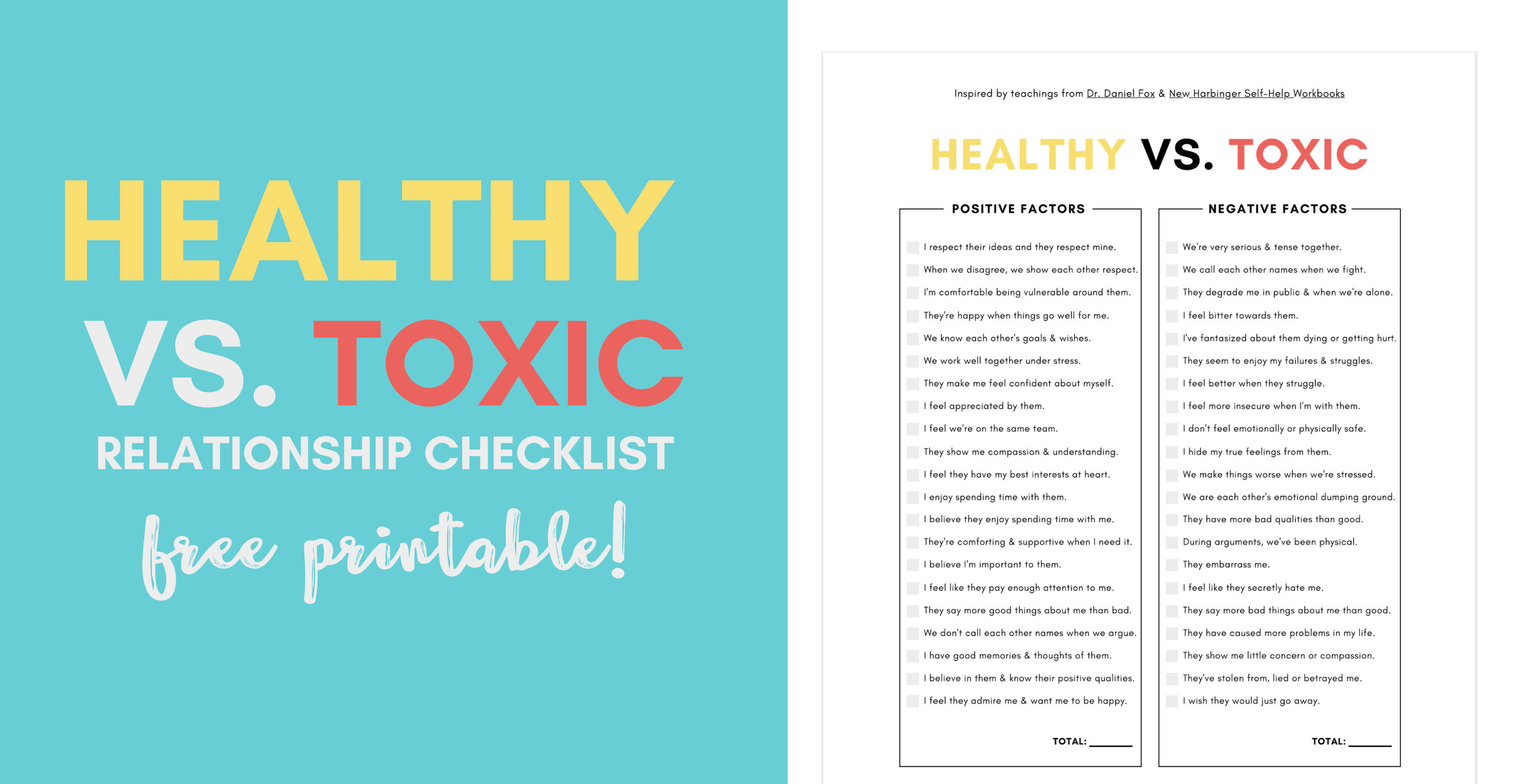
DOWNLOAD FREE PRINTABLE
Measure how healthy or unhealthy your BPD relationship is with the Healthy vs. Unhealthy Relationship Checklist.
My family member—a person with narcissistic traits, fed off the emotional reactions of others. They pushed buttons by showing how little they cared or by pretending not to know better, they’d invalidate concerns and seemed to enjoy being the center of attention when shit hit the fan. Their partner—a person with many borderline traits, feared their abandonment and would desperately try to prevent it by both controlling their every move or by abandoning them first.
“They don’t want to come over tonight, so I’m punishing them by leaving early,” the partner with BPD traits had said to me during one of their many arguments.
“Why don’t you just talk about it with them?” I asked. Back then, I had trouble minding my own business and I had no idea what was going on. “I’m sure they’re just tired from work. They don’t mean to hurt you.”
“No, if they cared they’d come over.”
And so they left without my family member.
I remember thinking the partner’s response was odd and childish. I don’t know how I had that insight at thirteen years old with no healthy relationship to model after (apart from healthy TV couples like Martha and Jonathon Kent on Smallville), but thankfully I did. I also knew, deep down, that I acted the same way with my own boyfriend.
In many ways, I related to my family member’s partner and I felt for them. They weren’t necessarily a bad person that wanted to harm those they loved, they were just incredibly lost and mentally ill. Maybe that’s a big reason why I’m better today. I didn’t want to be like them in my 40’s. I also didn’t want to be with someone like my family member, or be anything like them.
That night ended with my family member acting like nothing happened as their phone rang off the hook. The partner called, over and over again to no response. The voicemails they left sounded like an abandoned child’s. They went from sobbing and raging to yelling and begging all in the span of minutes.
My family member and the partner got back together the next day and this cycle continued on for a very long year. Watching them make up became more and more off putting the more I saw it.

BPD in Relationships
Of course, the above mentioned BPD and narcissist couple is just example of how these two personality disorders or traits can play out together. Neither were happy. Both were toxic. And ultimately, the relationships failed.
BPD and NPD relationships are incredibly common but that’s not to say every person with borderline personality disorder will fall for a narcissist. BPD in relationships make things complicated. But I do believe there’s hope. I’ve said this many times on social media and on this blog, and have sometimes received criticism in response (by people with BPD and without), but I’ll keep saying it: it’s been proven that BPD is treatable. Contrary to old beliefs in the medical world, recent research & studies of BPD have confirmed that treatment is not only possible but that BPD also has a high recovery success rate.
According to Perry D. Hoffman, Ph.D. of the National Education Alliance for Borderline Personality Disorder, research conducted by the National Institute of Mental Health shows:
- After two years, more than 50% patients recover.
- After 10 years, more than 80% recover.
- 88% remain in recovery.
Because our BPD is treatable, we are capable of having healthy relationships. They take more work than the average couple and I still wouldn’t recommend dating an untreated person with lots of narcissistic traits when you have BPD, but it’s not hopeless. If you’re struggling with BPD, get help. Join a DBT group. Learn about healthy communication and the red flags of an abusive relationship.
(Read ‘Healthy vs. Toxic Relationships: BPD Edition’)
Take accountability for any toxic traits you may possess and be okay with being less than perfect. Self-reflect and consider your relationships with others. Are they toxic? Do they help you grow? Are you preventing them from growing? These are important questions to consider.
Practice self-care. Practice mindfulness. And most importantly, don’t give up on yourself. Believe you can do better and eventually, you will.
BPD Resources
BPD in Fiction: Sadie’s Favorite, is a Novel + Original Soundtrack, that touches on BPD, favorite person (FP) relationships, healing after abuse, parenting and more. Written by Sarah Rose, creator of BPD Beautiful.
Get 20% off your first month of BetterHelp. Get matched with a licensed therapist within 48 hours. Subscriptions as low as $65/week, billed every 4 weeks. Cancel anytime.
Manage your BPD symptoms with a printable workbook.
See our recommended list of books about BPD.
Start a Discussion
Do you have experience as a BPD and narcissist couple? Share your borderline and narcissist relationship story in the comments.
Pin This Post
Liked this post? Please help support BPD Beautiful and spread BPD awareness by pinning it on Pinterest.
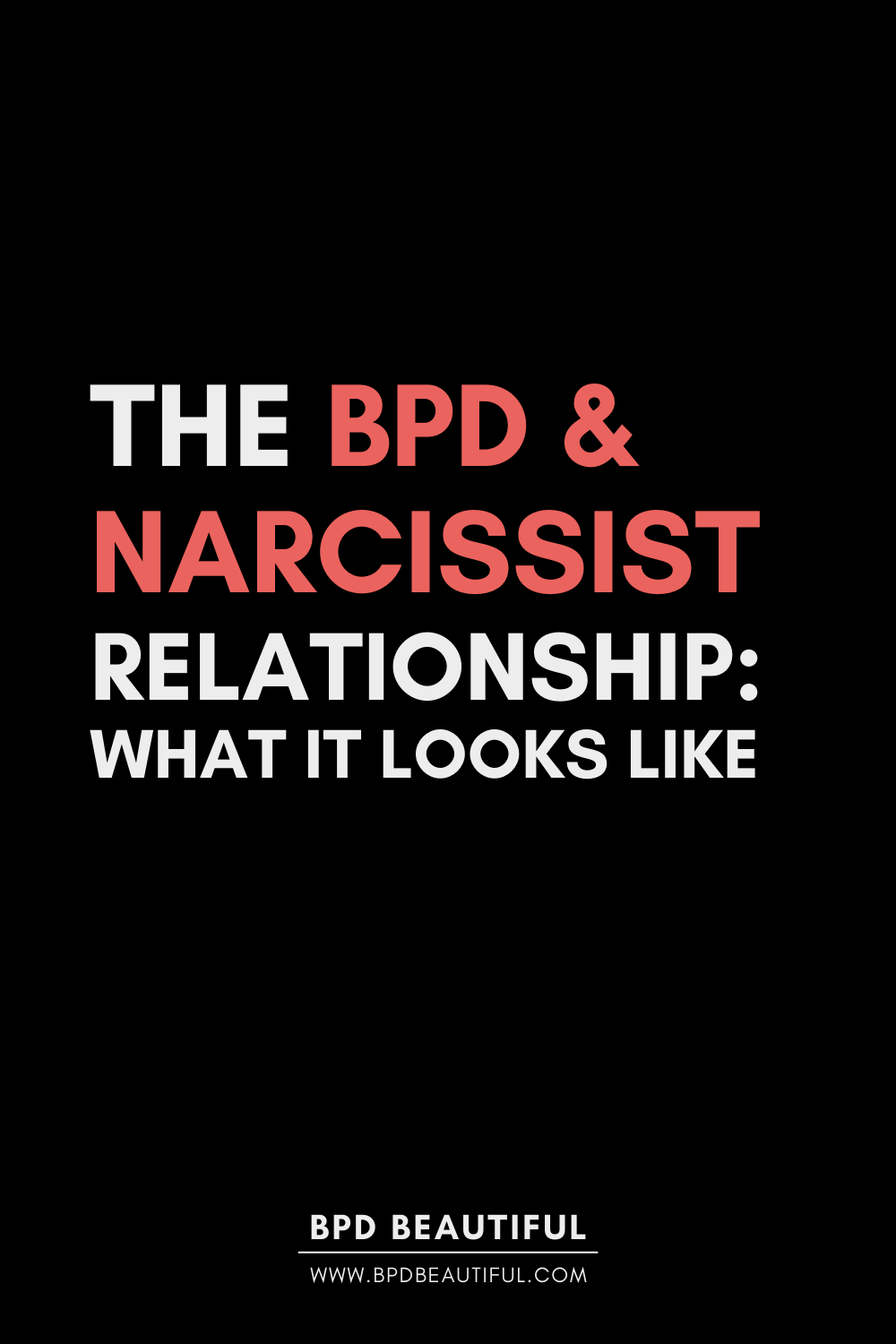


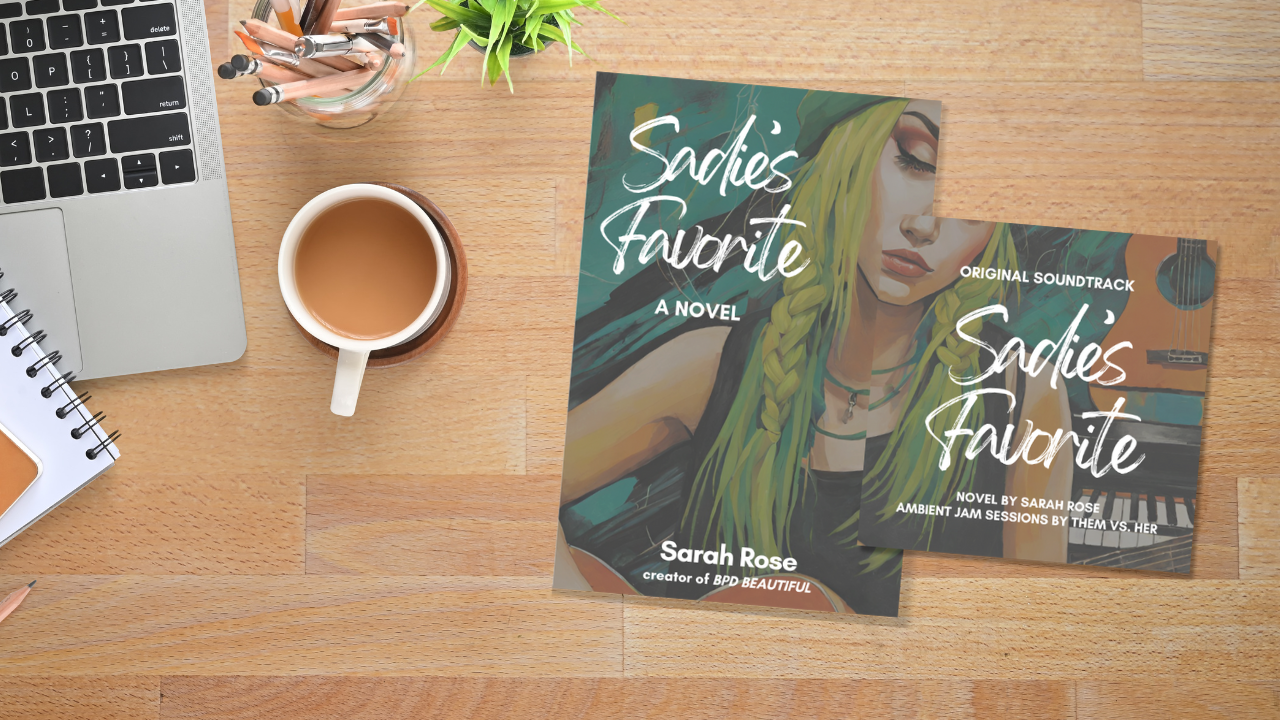

Comments
One response to “The BPD and Narcissist Couple: What it Looks Like”
Thank you for writing this article.
I just realized within the last day that my former significant other has undiagnosed BPD. We were together for 25 years. It was never easy, but there was love, and I’ve always tried to be supportive and patient. A crisis involving her adult son’s drug addiction destabilized her. Then a narcissist started pursuing and love-bombing her, and she left me for him four months ago. From what she’s been telling me, their relationship is turning volatile. I found your article helpful in better understanding this dynamic.